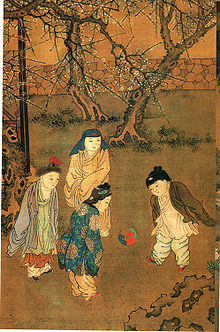Su Hanchen (Chinese: 蘇漢臣; pinyin: Sū Hànchén; 1094–1172)[2] was a Chinese painter active in the Song dynasty. A native of Bianjing (present-day Kaifeng, Henan), he was renowned for his figure paintings and was appointed as a "Painter-in-Attendance" by Emperor Huizong. For most of his career, Su was based in Zhejiang.

Career
editSu was born in 1094 in Bianjing (present-day Kaifeng, Henan).[2][3] He was employed by the Northern Song court's Academy of Painting "solely for his skills at painting",[4] and subsequently designated as a "Painter-in-Attendance" by Emperor Huizong. He was known for his figure paintings, especially those of women and children.[5][6]
In Su's seminal baizi (百子) or "hundred-boys" paintings,[7] "generic but appealing" children are usually depicted in gardens,[8] and can be seen engaging in various leisurely activities, from dancing to kite-flying.[2] Su also painted Buddhist and Taoist figures, although most of these paintings are now considered lost.[2] Su spent most of his career in Zhejiang.[9] He died in 1172.[2]
Legacy
editAccording to Gu Bing (顾炳), who included Su's Woman Bathing Child in his 1603 Master Gu's Painting Manual (Gushi huapu; 顧氏畫譜), Su's application of colour was "fresh" and he depicted figures "as though alive".[10] Art historian James Cahill remarked that Su's paintings "have an immediate appeal that has made them popular everywhere".[2] Two of his most celebrated works, Children Playing in an Autumn Garden and Children at Play on a Winter Day, are on display at the National Palace Museum in Taipei. According to the Shanghai Daily, these two paintings are "usually regarded as the best example of Song paintings themed on children playing in a private garden".[2]
References
editCitations
edit- ^ Tajima 2014, p. 195.
- ^ a b c d e f g Zhang 2019.
- ^ Li 2022, p. 275.
- ^ Caswell 2001, p. 199.
- ^ Watson 1981, p. 608.
- ^ Finnane 2022, p. 395.
- ^ Laureillard 2014, p. 53.
- ^ Kleutghen 2015, p. 108.
- ^ Huang 2021, p. 283.
- ^ Wong 2012, p. 32.
Bibliography
edit- Caswell, James O. (2001). "Lines of Communication: Some "Secrets of the Trade" in Chinese Painters' Use of "Perspectives"". Res: Anthropology and Aesthetics. 40 (1): 188–210. doi:10.1086/RESv40n1ms20167546. S2CID 168619428.
- Finnane, Antonia (2022). "Folding Fans and Early Modern Mirrors". In Dana Arnold; Katherine R. Tsiang; Martin J. Powers (eds.). A Companion to Chinese Art. Wiley. pp. 392–409. ISBN 9781119121695.
- Huang, Kunfeng (2021). Illustrated Guide to 50 Masterpieces of Chinese Paintings. Shanghai Press. ISBN 9781938368714.
- Kleutghen, Kristina (2015). Imperial Illusions: Crossing Pictorial Boundaries in the Qing Palaces. University of Washington Press. ISBN 9780295805528. JSTOR j.ctvcwn72v.
- Laureillard, Marie (2014). "Regret of Spring: The Child According to Feng Zikai". Oriens Extremus. 53: 47–60. JSTOR 26372423.
- Li, Xifan (2022). A General History of Chinese Art: From the Five Dynasties to the Yuan Dynasty. De Gruyter. ISBN 9783110790948.
- Tajima, Tatsuya (2014). "Karako Asobi: Images of Chinese Children at Play". Images of Familial Intimacy in Eastern and Western Art. Brill. pp. 185–217. doi:10.1163/9789004261945_007. ISBN 9789004261945.
- Watson, William (1981). Art of Dynastic China. Harry N. Abrams. ISBN 9780810906273.
- Wong, Aida Yuen (2012). Visualizing Beauty: Gender and Ideology in Modern East Asia. Hong Kong University Press. ISBN 9789888083893.
- Zhang, Peter (16 June 2019). "The Knickknack Peddler". Shanghai Daily. Retrieved 29 October 2022.